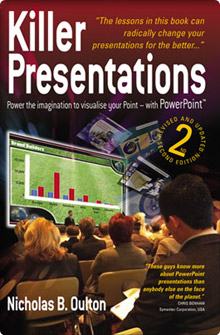
Scripts: The root of all presentation evil!
In anticipation of a new blog.. here is one I wrote in 2009.. watch this space.. comments please!
- Don’t use speaker notes.
- Don’t write scripts.
- Don’t wear white socks.
- Why? Because you will come across as an amature!
Occasionally when presenters use a script they end up concentrating on it more than on the audience, which is a recipe for disaster. Presentations need to be dynamic and audience-centered. A script, almost by definition, prevents dynamism by compelling you to follow it. Therein lies the real problem..
When you use a script you ignore your slides, when you ignore your slides you drive a wedge between phonetic information (you) and visual information (the screen). That prevents Dual Encoding (understanding by the audience of what they hear and what they see at the same time).
Unless you are very, very, very good at presenting using a script won’t work well. (A professional actor can sometimes pull it off, and some TV presenters can read an auto-cue and make it look natural, but one only needs to see the show Have I Got News for You in the UK to see the difference between a professional and an amateur.)
So why do people do it? Well, like a number of things that people do to help when they are stressed, it’s easy. You have been reading since you were 3 or 4, and you can do it in your sleep (well, OK not really but it is easy). Reading is easy, and so using a script to help overcome stress is a popular approach – especially when your brain chemistry is being altered by that wonderful survival drug adrenalin.
Those that can do; those that can’t… read a script.

Comments
Not sure I fully agree! … If you LEARN your script, indeed like an actor, then you don’t need to read and can focus on the audience. Having a script diffuses the nervousness + you can plan transitions between slides which makes the presentation more fluid.
A script doesn’t mean that you either read or memorize it. It just means that you wrote down what you were going to say. Then, you can practice from it, time it and record it and make necessary adjustments — is it too short or long? Does it make sense? Do I say “you know” too often? Does it meet the audience’s needs? It’s just a starting point. Once you’ve gone over it several times, then you can easily depart from it, make adjustments as needed, and respond to the audience. It becomes a firm foundation on which you can freely build. So I think I just have a slightly different definition of the word “script.”
I agree with Jeff. I guess I have a different definition of “script.” A script is where you write out what you will say and you use it to practice. Without one — and it can be full sentences or just notes, depending on how fluidly your speak — you don’t know how long your talk will take. So I teach to plan, then write the script, then speak it out, recording and timing it. Then you edit. When it’s right, you create your slides and practice with them. After the 4th or 5th practice, you don’t need the script. Then, you’re ready to present and can pay attention to your slides and most importantly, your audience.